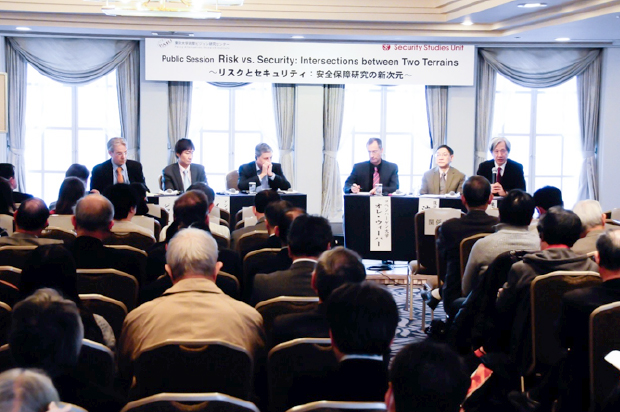Risk vs. Security: Intersections between Two Terrains
| Date: | Saturday, January 30 2016, 14:30-16:30 |
|---|---|
| Venue: | Keio Plaza Hotel Tokyo 44th floor "Ensemble" |
| Speakers: |
G. John Ikenberry (Princeton University) Ole Wæver (University of Copenhagen) Shen Dingli (Fudan University) Christopher Coker (London School of Economics) Yee Kuang Heng (National University of Singapore) |
| Moderator: | Kiichi Fujiwara (University of Tokyo) |
| Language: | English/Japanese simultaneous interpretation |
| Hosted by: | Security Studies Unit, Policy Alternatives Research Institute, the University of Tokyo |
*This workshop was organized by subsidies from the Ministry of Foreign Affairs.
-
“Risk vs. Security: Intersections between Two Terrains”
Movie : 1:26:26
The Security Studies Unit (SSU) of the Policy Alternatives Research Institute hosted the Workshop on Risks in International Society and New Dimension of Security held at the Keio Plaza Hotel (Tokyo), on January 29-30, 2016. The event was made possible by the kind support of the Japan’s Ministry of Foreign Affairs, and saw the participation of very distinguished scholars not only from Japan but also from each countries.
The workshop extended over two consecutive days with five closed sessions and a public session entitled Risk vs. Security: Intersections between Two Terrains.
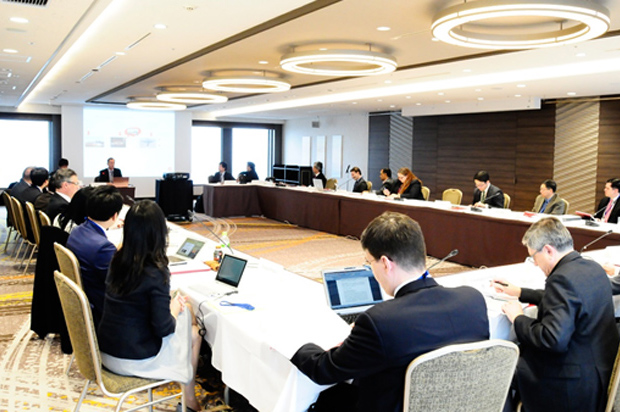
Photo: Izawa Hiroyuki
Session 1 – Security Community vs. Risk Community?
Theories and Issues
This session focused on the exploration of alternative categories to security for thinking about the emerging challenges of a complex, interconnected world.
Particularly the concept of “risk” has emerged as one of the most powerful analytical tools, with important consequences on the political and organisational level. On the one hand, traditional conceptions of security are still prevailing, but governments are increasingly looking for ways to assess the probability of threats which are currently unknown (precisely the definition of risk). Consequently, we have witnessed the rise of a “risk assessment” and “horizon scanning” movement at global level, as also demonstrated by the debate on this topic at the recent World Economic Forum in Davos.
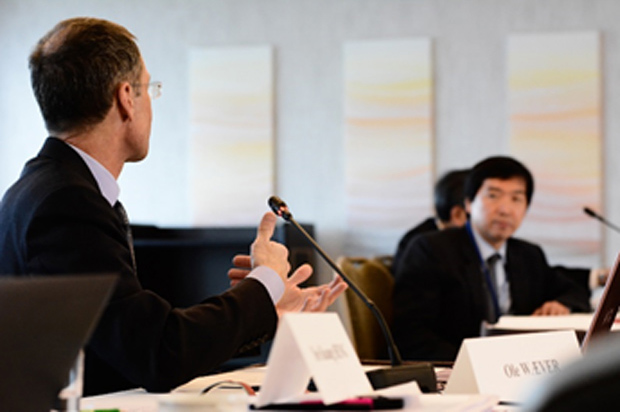
Some governments have therefore moved on to the creation of risk assessment documents, as in the case of Singapore, while for others, such as Japan, the development of “risk communities” appears to be hold back by a number of barriers in the bureaucratic structure, political culture, and the psychology of numerous governmental agencies.
Session 2 – Case Study (1) Nuclear Security/Risk
The debate in this session has explored a number of themes associated with the changing nature of risks pertaining the use of nuclear technologies, both military and civilian. Alongside persisting security questions related to unauthorised handling and access to nuclear weapons and fissile materials, panellists have discussed the thorny question of the globally growing stockpiles of fissile materials, particularly of plutonium as a by-product of nuclear fuel re-processing. Such question appears of special importance for Japan as this country holds currently the largest stockpile of plutonium in the world. Furthermore, two other topics have been touched upon, namely the trajectory of nuclear power generation after the Fukushima Daiichi accident of 2011, and nuclear proliferation. Regarding the first point, the Fukushima accident has changed the political orientation towards nuclear power generation in some countries, which have decided to phase out such technologies, while in others the commitment to the expansion of nuclear power generation has been confirmed. With reference to the second point, historical research has shown that sheer military alliances vis-à-vis common enemies may not per se be able to prevent nuclear proliferation, while the credibility of deterrence appears the key factor to stop political leaders from pursuing the acquisition of nuclear weapons. The task of limiting proliferation seems particularly difficult in the current age of growing uncertainty and less clearly defined alliances.
Session 3 – Case Study (2) Space Security/Risk
This panel introduced one of the newest topics in the security discourse, namely the question of space security, which is articulated in a number of sub-topics. Space is today a crucially important area where vitally important assets (namely various kinds of artificial satellites) are located to provide communication, monitoring, and intelligence services without which not only modern defence, but our complex industrial economy could not function. However, those assets are exposed to a series of threats. Space is indeed becoming increasingly crowded, contested, and militarised.
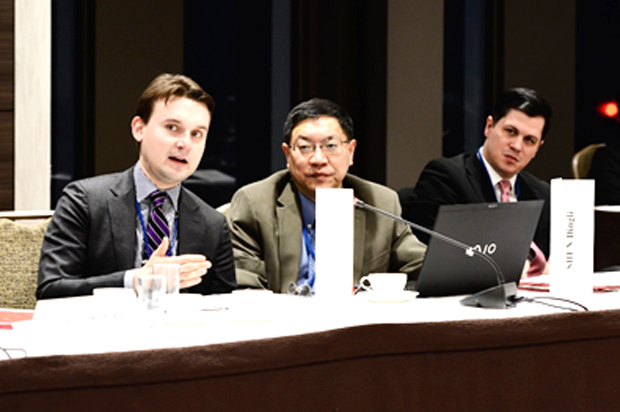
Leading military powers are now developing instruments for the possible targeting of rival satellites in case of war, signalling that a war can expand to the space, or it may start in space and expand successively to other domains. Despite the commonality of the space security problem, it appears today that some kind of international agreement about a shared code of conduct is unlikely to be reached in the next future. Furthermore, the question of space debris has been discussed, namely the threat posed to space equipment by orbiting objects or fragments thereof which are no longer in use. The quantity of such debris has dramatically increased in the past twenty years, prompting a global debate on how to tackle the issue. However, also because of the dual use (military/civilian) of nearly all space technologies, there is reluctance from the major space powers to commit to a major change in their policies.
Session 4 – Case Study (3) Cyber Security/Risk
Alongside space and nuclear technologies, the question of security of electronic networks is rapidly becoming a crucial security problem, not only for governments, but for the numerous private companies which provide and/or rely upon internet and other electronic services. The panel has discussed the emerging threat of sabotage and possible terrorism coming from the spread of computer viruses able to inflict damage to physical infrastructures, particularly in the case of highly sensitive targets like nuclear reactors. Successively, the discussion has focused on the problem of ensuring security to vital computer infrastructure operated by governments and private companies, which require continuous update and investments due to the rapidly changing nature of cyber attacks. However, cyber security is not just a question of collective organisations, but also of private citizens accessing online services and other data transmission systems.
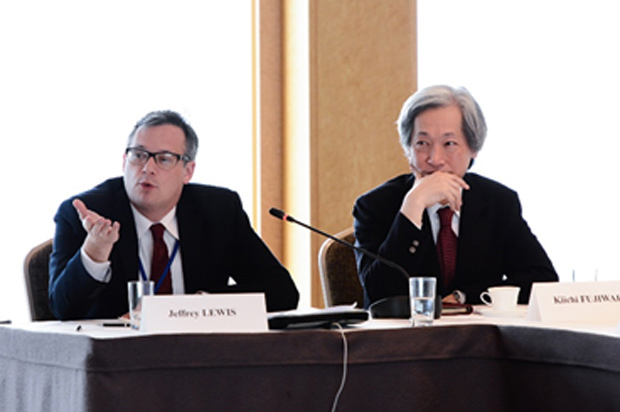
As in previously discussed, in all newly emergent security domains, despite the commonality of such threats worldwide, international cooperation remains very limited and no international code of conduct has been so far agreed, although initiatives in such direction already exist.
Session 5 - Intersection of Security and Risk
Summing up the basic concepts emerged up to this point during the workshop, Professor Ikenberry introduced the panel by inviting the participants to recover the simplicity within the complexity of the matters which have been explored in their technical details, by making sense of such complexity. How is it possible to work together on the challenges humanity is facing? The various panellists have highlighted the persistent of different, even competing definitions and logics of security, and the increasing amount and seriousness of risks to which human societies are inevitably exposed as a consequence of their complexity and of their reliance to imperfect technologies.
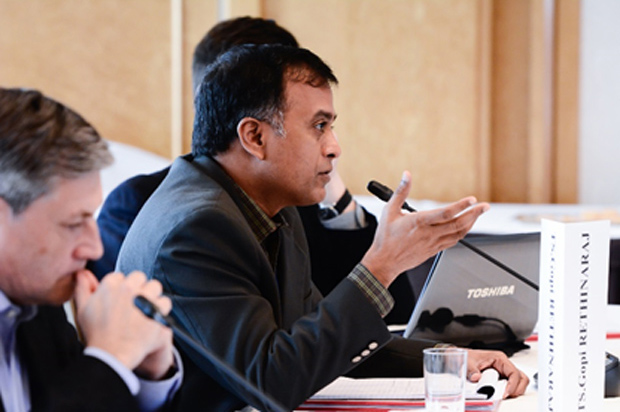
It has once more emerged that, despite the commonality of many problems lying at the intersection of international politics and technologies, the international community is currently struggling to abandon a national view on security and risk in favour of a more internationalist approach which may one day yield common norms and rules of conduct.
Public Session Risk vs. Security: Intersections between Two Terrains
The Workshop on Risks in International Society and New Dimension of Security was concluded by a public event taking place between14:30 and 16:30 at the Keio Plaza Hotel in Shinjuku, Tokyo. It was chaired by Professor Kiichi Fujiwara, Director of the Security Studies Unit of the Policy Alternatives Research Institute, and saw the participation of Professor Ole Wæver from the University of Copenhagen, Professor Christopher Coker from the London School of Economics and Political Science (LSE), Professor Heng from the National University of Singapore, Professor Dingli Shen from Fudan University (Shanghai), and Professor G. John Ikenberry from Princeton University.
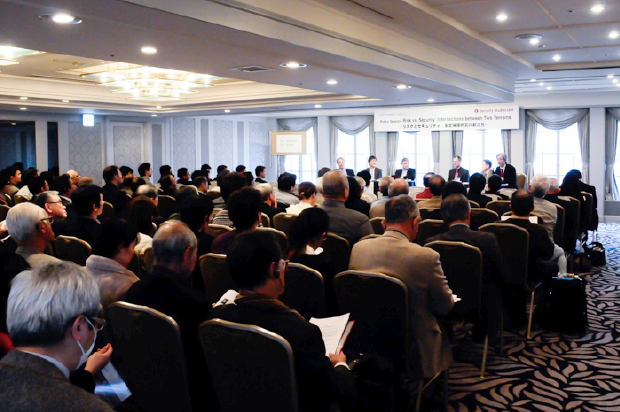
The public session was opened by Professor Fujiwara, who illustrated to the public the purpose of the workshop. This consisted in exploring alternative and possibly unconventional views on security. Indeed, in the security discourse there is often a recurrence of motives which are now almost taken for grated, such as the geostrategic friction between China and the broader East Asia region, or the threat posed by the DPRK to its neighbours. However, there are numerous newly emerging threats, in a rapidly changing security environment. One may think about the sudden appearance of ISIS as one example, but other security issues concern less debated assests of our technological world, such as nuclear, space and cyber technologies. This workshop has been organised precisely with the aim of tacking these emerging questions lying in the grey areas between international political studies and technology. He then proceeded to introduce the speakers, who in turn delivered a short statement.
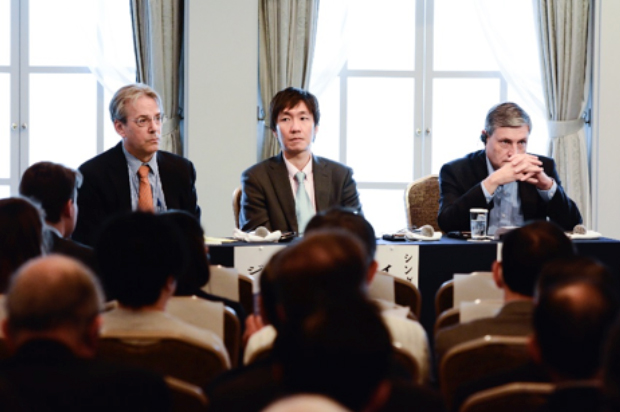
Professor Ikenberry expressed grear appreciation for the successful workshop, which highlighted the existence of two logics of security, namely a traditional logic, one concerned with security threats, such as emerged after the First World War, dealing with alliances, arm races, deterrence and so forth; and a new security logic, preoccupied with the challenges coming from technological developments, i.e. those challenges which come from modernity itself. This second set of threats and challenges are of diverse nature, some emerge in the form of accidents, others as deliberate attacks, sabotage, or terrorism. There is in any case a growing sense of mutuallty shared vulnerability, which will hopefully lead to ways to cooperate internationally and manage these issues. Finally, Professor Ikenberry stressed that the second logic does not trup the first one, as this continues to persist; secondly, despite the clear need to build risk communities and collectively manage risks, this task entails numerous difficulties; thirdly, there is an inherent hurdle in trying to tackle issues which appear to be both systemic and long term, as most security actors concentrate overwhelmingly on relatively short term threats.
Professor Coker as well pronounced words of appreciation for the productive workshop, where the complexity of new security dimensions has emerged very clearly. There are now two parallel dimensions of security. One has been the traditional dimension of strategy, which is coming back after a time of relative ease following the end of the Cold War. The other is the convergence of a series of crises, demographic, environmental, economic, which can have devastating political consequences. Professor Coker recalled for instance how the collapse of the Syrian regime has been triggered, among other things, by an unprecedented draught which forced millions of Syrians to move from the countryside to the cities, causing a socio-political domino effect. He has expressed all his concern about the dire situation in the Middle East, which in his opinion will probably see further deterioration in the near future. Even in other parts of the word we are seeing a diminished international cooperation, as people turn primarily to the state in time of acute crisis, rather than to international institutions, something which is then reflected in a return of identity politics worldwide, including in the US and EU.
Professor Shen spoke about the problem of nuclear security, particularly concerning nuclear weapons. Many of these questions have been discussed in details already during the Cold War, however today we face more complex threats, which add on the traditional ones concerning the safety of warheads and of fissile materials. Concerning the latter, Professor Shen expressed his concern about the growing stockpile of plutonium, with Japan currently having the largest amount of such material; he therefore underscored the need for hightened collaboration and sharing of information.
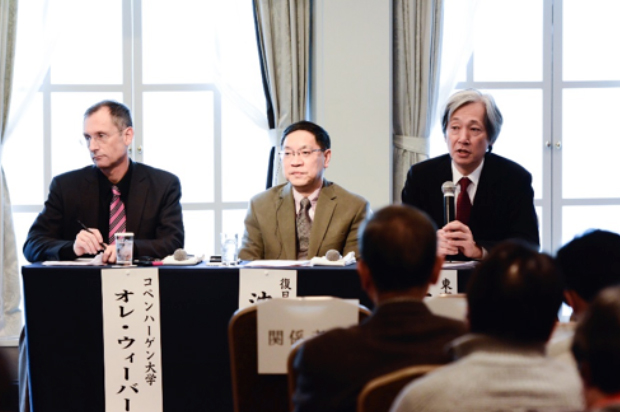
Professor Heng highlighted five points with regard to emerging security themes. 1) Globalisation massively contributes to the growth and the spread of security issues, particularly because of the ease with which people can circulate, as very clear in the case of pandemics; 2) Urbanisation adds even more to the interconnectedness, as most people today live in cities, and cities are precisely the poles of global connections; 3) In opposition to a fairly recent past when large scale risk were primarily the problems of government, we see today an increasing risk burden for private companies, especially those operating infrastructures and systems which are vital for our complex economies and societies; 4) Governments are more and more aware of these risks, and many are moving towards or are already engaged in the production of national risk assessments, such as in Singapore; 5) Governmental response to risk and to the results of risk assessment execise is expressed in particular in new forms of policy assessment and agency coordination, overcoming the traditional bureaucratic compartmentalisation.
Professor Wæver opened his intervention by recalling the difficulty in construting a hierarchy of security threats. Indeed, different experts, if interviewed on this point, would certainly produce very different answers, making use of different categories and ways of facing the problem. In general, he stated that it is possible to identify three logics of threat assessment, namely: a) the logic of security, which identifies what cannot be allowed to happen, those elements which have to be protected; b) the logic of risk, whereby a certain amount of risk is inevitable, and the question is therefore a matter of calculation and management; c) the logic of uncertainty, which encompasses ideally also elements which are not only unknown (like risk), but also unknowable. Each of these approaches offers advanteges and disadvantages, although Professor Wæver remains convinced that the logic of security still trumps on its conceptual competitors.
